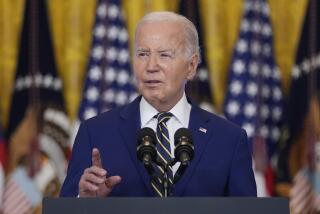PERU : Amnesty Law for Rights Abuses Doesn’t Get Military Off the Hook
LIMA, Peru — With the stroke of a pen, an amnesty law signed recently by President Alberto Fujimori was supposed to exempt military personnel from imprisonment or prosecution for human rights crimes during the past 15 years. But they aren’t getting off the hook quite so easily.
The amnesty, hastily passed by the pro-Fujimori Congress on June 14, is being challenged by a Lima judge. Human rights groups threaten to launch a campaign to repeal it by popular referendum.
The law grants amnesty to military, police or civilian personnel accused of crimes committed in “the struggle against terrorism” since May, 1980, when Sendero Luminoso (Shining Path) guerrillas began a rebellion that reached its bloody peak in 1992. The Maoist movement has been in sharp decline since then, although it still makes sporadic strikes.
Defending the new amnesty law, Fujimori has said that some members of the military committed “entirely reprehensible acts” while trying to protect society in a complex and risky conflict. He said he does not justify such acts “but I want that period of violence to be left behind with the amnesty measure.” Instead, however, the law has rekindled heated criticism of past rights abuses, including several mass murders. Last weekend, about 2,000 protesters marched through downtown Lima. “Fujimori killer,” they chanted. “Neither forget nor forgive.”
*
Opponents of the amnesty include human rights groups, the national bar association, Roman Catholic Church leaders, newspapers and magazines, and even members of Fujimori’s Change 90 party. The U.S. government expressed concern that Fujimori signed the law.
Fujimori has a close relationship with the armed forces, which backed his “self-coup” that closed an opposition Congress in April, 1992.
In addition to clearing officials accused of “dirty war” crimes, the amnesty favors officers who took part in a November, 1992, coup attempt and others jailed or exiled for criticizing the military. But analysts say the law’s main purpose was to exonerate officers accused of involvement in two notorious massacre cases, known as La Cantuta and Barrios Altos, blamed on a secret army death squad allegedly formed to eliminate subversive groups.
In July, 1992, soldiers and hooded gunmen abducted nine students and a professor from La Cantuta teachers college, a center of leftist activity. Charred remains of the victims were found more than a year later. The amnesty already has permitted the release of nine army men, including a general, who were sentenced to prison by a military court in 1994 for the slayings.
But the law did not immediately stop the probe by a civilian court of a 1991 massacre in which 16 people were slain at a barbecue in the poor Barrios Altos section of Lima.
Judge Antonia Saquicuray, who is investigating the Barrios Altos case, has ruled that the amnesty does not apply because international conventions requiring prosecution in such human rights crimes take precedence. Next week, a higher court is scheduled to review Saquicuray’s decision, and the case is likely to go to the Supreme Court.
More to Read
Sign up for Essential California
The most important California stories and recommendations in your inbox every morning.
You may occasionally receive promotional content from the Los Angeles Times.










